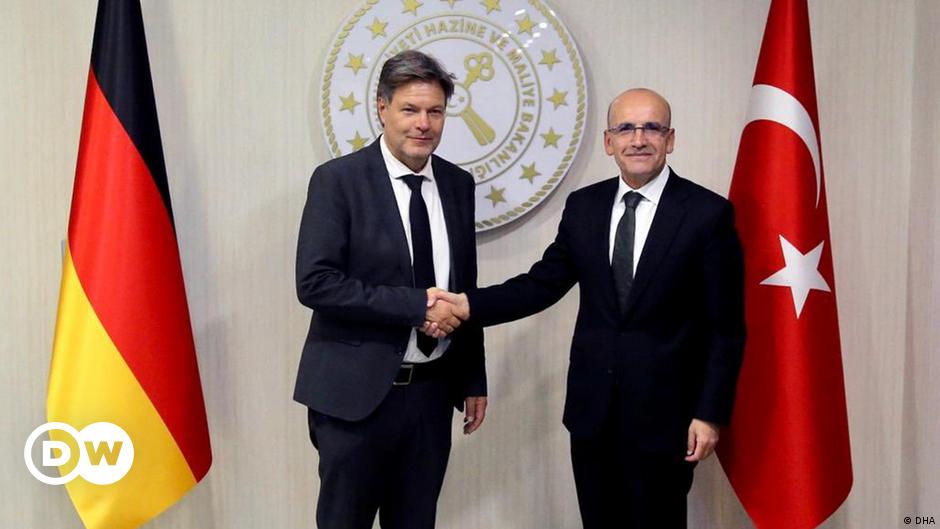Despite countless political controversies and crises in recent years, economic relations between Germany and Turkey have been steadily improving. For many years, Germany has been Turkey’s largest trading partner and ranked as one of its top foreign investors.
According to the German Foreign Ministry, bilateral trade between the two countries “reached a record high” at 51.6 billion euros ($56 billion) in 2022. Compared to the previous year, Turkish exports to Germany increased by 26.7 percent to 24.6 billion euros, while Turkish imports from Germany increased by a third to 27 billion euros.
Germany remains Türkiye’s most important export destination. The Turkish Exporters Council (TIM) estimates that Turkey exported goods worth 14.5 billion euros to Germany by the end of October this year. These products primarily include products for the automotive industry, textiles, food products, boilers, and intermediate products made from iron, steel, and aluminium.
Turkey mainly imports machinery, vehicles, plastic products, aircraft, chemicals and medical equipment from Germany. Only Russia and China export more goods to Turkey than Germany.
Ayhan Zeytinoglu, chairman of the Istanbul-based Economic Development Foundation (IKV), said economic ties between Germany and Turkey are deep-rooted and can withstand crises: “Among Turkey’s largest trading partners, Germany is at the forefront. We have significant trade deficits with Russia and China, but we have a balanced relationship with Germany.”
Turkey has exported 14.5 billion euros worth of goods to Germany so far this year, including products for the automotive industry. Image: Murat Çetinmuhurdar/Turkish Presidential Office/Handout AA/Image Alliance
What business executives want from Erdoğan’s visit to Berlin
Among other pressing issues that Turkish President Recep Tayyip Erdogan must address during his visit to Berlin, Turkish business representatives have urged him to address Turkey’s customs union with the European Union, which they say Germany wants to use its influence to push for modernization.
Zeytinonglu said modernizing the customs union could double trade volume to around 90 billion euros. “We hope that some action will be taken during the president’s visit,” he said.
The Customs Union has been in place since 1995 and provides for the free exchange of goods and coordination of tariffs and regulations between the two countries.
Critics calling for reform point to the difficulties of consultation and dispute resolution arrangements, while Turkey complains that visa restrictions on businessmen and truck drivers prevent the free movement of goods.
Exporters are also dissatisfied with the current situation. Bülent Eymen is Vice-President of the Association of Mediterranean Furniture, Paper and Forest Products Exporters (AKIB). He explained that more than 25 years have passed since the Customs Union was established, and that global trade has developed during this time. “The customs union can no longer meet the needs of the economy,” he said.
He fears the topic will be sidelined during Erdogan’s visit. “But this is a very urgent and important topic for the Turkish economy. I hope this issue will be taken up, at least in Germany,” Aymen added.
Turkey complains that visa restrictions on businessmen and truck drivers prevent the free movement of goods.Photo: Mustafa Kaya/Xinhua/Picture Alliance
How Türkiye and Germany “need each other”
The German Chamber of Commerce Abroad (AHK) estimates that German companies will invest around 11.5 billion euros in Turkey between 2002 and 2022. This means that more than 6% of foreign investments in Turkey will come from Germany.
More than 8,000 German companies (German-owned or with German investment) operate in Turkey, mainly in the fields of industry, retail, logistics and distribution.
Zeytinoglu believes that Germany and Turkey need each other. “Turkey can benefit from Germany’s technological and financial strength, and Germany can benefit from Turkey’s geopolitical power. Regarding the customs union, the two countries can work together to create new synergies. It is possible,” he said.
Turkish business representatives have also called for Turkey to have a say in EU free trade agreements. Zeytinoglu said it would be a “big injustice” for the EU to sign free trade agreements with third countries without going through Turkey. “As part of the customs union, we should be at the negotiating table when such agreements are signed,” he said.
This has caused Turkey to suffer “huge losses” in foreign markets, Aymen said, and he believes that if Turkey had joined free trade talks, Turkish companies today would be more successful in many countries, including South Africa and Algeria.
Cooperation on renewable energy
In addition to traditional trade areas, new business areas have also emerged between the two countries in recent years. Most of them concern the energy transition from fossil fuels to renewable sources.
In 2012, the two governments launched the German-Turkish Energy Partnership, which aims to enable representatives of politics, business, science and civil society to exchange views on the energy transition.
German wind turbine manufacturers such as Enercon and Nordex have large factories in Turkey.
Energy transition brings new opportunities for German-Turkish business partnership Image: Mahmut Serdar Alakus/AA/picture Alliance
Türkiye’s domestic economy continues to struggle
Turkey’s leadership’s rhetoric has repeatedly undermined investor confidence in the country.
In June, Erdogan appointed Mehmet Simsek to head the country’s economic portfolio in the hopes of taming inflation and scoring points abroad.
Simsek is an internationally recognized financial expert and advocate of a liberal market approach. He served as finance minister from 2009 to 2015, a relatively free period for the AKP government.
Simsek is currently on a journey to restore confidence in Turkey, but so far he appears to have had little success. The Turkish lira has been in decline since the new parliament was voted in in May. Just before the elections, the price of 1 euro was about 21.50 Turkish Lira. Recently, it has exceeded 31 lira.
Simsek called on the EU to modernize its customs union during a panel discussion in Salzburg, Austria, in July. EU Economic Commissioner Paolo Gentiloni gave an evasive response, underscoring how troubled relations between Europe and Turkey are currently.
Gentiloni said there were “difficult issues” to resolve. Only time will tell whether progress is possible.
This article has been translated from German.


